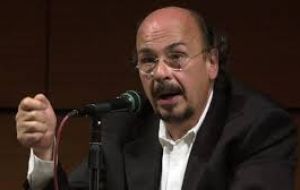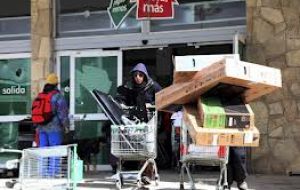MercoPress. South Atlantic News Agency
Argentina's police strike and looting: a blend of inflation, corruption, impunity and social division
 Morales Solá: a social breakdown not acknowledged by government
Morales Solá: a social breakdown not acknowledged by government The rash of looting and rioting which has spread to most of Argentina's provinces as the police went on strike or protest demanding better pay and working conditions has taken the political system by surprise, which has been slow in reacting to the gravity of the situation.
Since the outbreak of the rash last week took off in Cordoba, ruled by a non-Kirchnerite governor, the government of Cristina Fernandez tried to humiliate him as incompetent and irresponsible. However the police strike was followed by massive looting in over 1.000 shops and supermarkets, and the rash rapidly spread, even to pro-government provinces, as a first substantial hike for police officers and rank and file was worked out.
Now the rash has extended to almost the 24 provinces, has left so far ten people killed, millions of dollars in damaged property, but probably the most serious consequence of the repeated incidents is the loss of authority and respect for the political class. In several cities shops remain closed and transport is down to a minimum during daylight, while the government of President Cristina Fernandez and some representatives of the political system prepare for the big celebration of thirty years of democracy, precisely on Human Rights Day.
According to some Argentine political analysts that are trying to sort out what is really going on, disenchantment with the system, corruption, inflation and an extended patronizing dole-network has created the perfect cocktail, and police forces, on the beat and not isolated from every-day issues, are the best gauges of such situation, and the first to protest.
Salary and work conditions agreements reached with protesting police forces are anywhere between 50% and gradually climbing to 100% in the next six months, which gives an idea of the magnitude of inflation, a forbidden word for the Kirchner model, and the weakness or lack of strong ground of the political system.
Joaquin Morales Solá a respected political analyst and La Nacion columnist says the problem is quite simple: the social crisis which is not acknowledged by government. “Police is in a state of revolt because, it knows plain well and better than anybody else that social links in Argentina have been broken and citizen's responsibility has become an archeological obligation. They also know that there are numerous sectors living in abject misery, that have lost all hope of climbing the social ladder and grabbing a led television set is the only possible revolution in their condemned lives”.
Furthermore the police is aware that social resentment is widely spread among many Argentines and “inflation which hits everybody is particularly devastating for the very poor sectors and is a phenomena that brings together the sufferings of police rank and file and those deprived”.
Another political analyst Francisco Laborda enumerated a list of issues that could help explain what is going on in Argentina, which contrary to other lootings this time included not only the big supermarkets, but also small shops and even private homes.
a) Law and order is losing to social anomia; police are limited in action against pickets while the government message is associated to confrontation and spiraling hate and resentment in several sectors of society.
b) The growing feeling of impunity: when government corruption scandals go unpunished, why should looting be punished? Particularly when looters are living in the fringe of poverty and the big shots are never locked up.
c) Inflation under the Cristina Fernandez interpretation is not caused because of a bloated budget and deficit, but because economic agents want to maximize profits. This easily leads to blame businesses for inflation and high prices and thus what's wrong with looting a looter.
d) The proliferation of a policy and culture of handouts, living off the dole, as sponsored by the government of President Cristina Fernandez and several provinces. But when there are not enough resources to go around or some are excluded from benefits, what is wrong with looting to recover the dole lost?
e) The lack of prospects for many poor people, who although don't have basic needs unsatisfied have gone out to the streets to get hold of whatever they could lay their hands on. A priest of one of the many shanty towns or 'misery villages' as they are called in Argentina, pointed out that when he asked children what they would like to be in the future, a majority replied a “picketer”, which are a very common (contracted and paid) political expression in the country's main cities.
But Laborda adds that he wouldn't be surprised if nowadays the children would reply a (drug) 'dealer' or involved in narcotics, which has become a fast way of making cash in 'misery villages' and their city outskirts.
A recent report from the Narcotics Office in Cordoba said that in the city (1.5 million population) over 2.500 drug outlets had been located. This means 2.500 families living off the trade, and having that number out in the streets can really generate a massive protest.
Morales Solá also quotes Antonio Bonfatti, governor of Santa Fe, Argentina's fourth largest district who admitted intelligence reports showed evident links and complicity of the police with the drugs trade. Narcotics and poor salaries are an “explosive blend”.
Finally Morales Solá refers to police-members' unions, banned under Argentina law but which is evident from all the protests, that they exist underground or have a skeleton organization.
“Organizations carrying arms, which respond to a vertical obedience command makes any form of police unions non recommendable since it is not prudent to negotiate under such conditions, but jumping from a vertical disciplinary order to something like a chaotic 'students' open assembly' is not advisable either”.





Top Comments
Disclaimer & comment rules-

-

-

Read all commentsOld fairy tales and failed wishful thinking...., Mr. Morales Solá...
Dec 10th, 2013 - 11:02 pm 0The police extortion episode is over as we speak....
Time now to focus on “La Maldita Policia”…
Your good friends…
I think the most interesting quote from above is:
Dec 10th, 2013 - 11:10 pm 0“the government message is associated to confrontation and spiraling hate and resentment”
And this is true. When the government makes it a norm to spew bile and hate upon any detractors or opposition, then it is hardly surprising that civil society as a whole takes up that theme.
The fact that one of our resident forum members from Argentina calls it “extortion” just proves my point. When vital workers of Argentine society, who are dealing with 25% inflation and unable to earn a living wage, find they have no possible recourse other than to strike; this is called extortion?
From what I have read, hospital workers are now “extorting” the government so they can actually earn a living wage too.
Kirchnerism is reaping what it has sown over the past decade.
The police strikes/actions/“extortions” are a sympton and not a cause.
The cause is Kirchnerism.
Awwh, ain't that sweet, today Argentina celebrates 30 years of 'democracy'.
Dec 10th, 2013 - 11:11 pm 0Another 30 years and she'll soon be weaned onto solids: give it 50 and than those dang nappies are history baby!
Commenting for this story is now closed.
If you have a Facebook account, become a fan and comment on our Facebook Page!